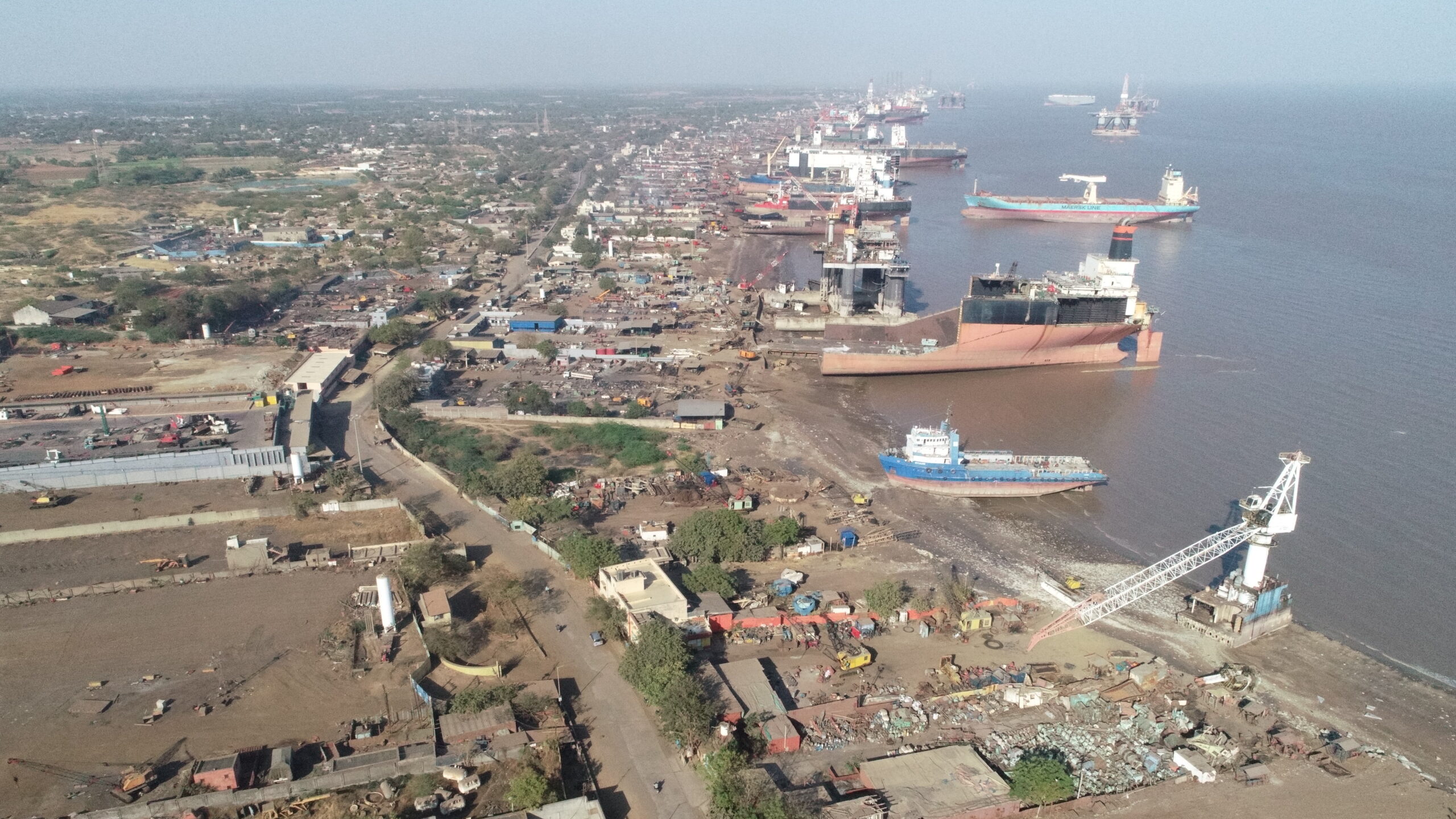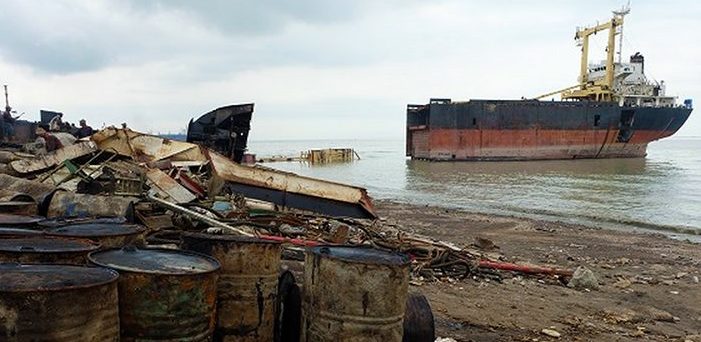Ship Recycling market is on the cusp of a significant shift: STAR ASIA
The ship recycling market is on the cusp of a significant shift, driven by declining dry bulk freight rates coupled with ailing demand, a double whammy. The industry is now gearing up to see a significant influx of end-of-life ships, which will determine the new pricing trends. However, the irony lies in the fact that domestic markets, struggling with weak demand, have seen a steep downturn. This has created a scenario where a major price correction in ship recycling appears inevitable to align with domestic fundamentals and ensure long-term business sustainability.

As more shipowners begin to offload end-of-life vessels for recycling, ship supply pressures have started to ease. Looking ahead, November is expected to be a pivotal month, likely setting new pricing trends for the industry. The easing of ship supply will be the catalyst going forward to bring the market back to normal.
On the global steel production front, the crude steel production for the 71 countries reporting to the World Steel Association (worldsteel) reached 143.6 million tonnes in September 2024, reflecting a 4.7% decline compared to the same month last year. Meanwhile, China’s crude steel production fell to 77.1 million tons in September 2024, marking a 6.1% year-on-year decline. This signals potential market adjustments or a shift in domestic demand. The global steel industry will be closely watching how this development influences broader market dynamics.
Alang, India
This week saw significant turbulence in the domestic ship scrap markets as prices sharply reversed course, erasing all gains made over the past month, a pure knee-jerk effect. In just one week, prices plummeted by approximately 2.5%, leaving the industry in a state of confusion.
Despite earlier signs of stabilisation in the domestic ship scrap prices, the demand for steel quickly faltered, pushing the markets back into uncertainty.
After 42 years of faithful service across the world’s oceans, MSC EYRA embarks on her final voyage to Alang’s shores, where she will gracefully conclude her maritime journey. Throughout her illustrious career, this 10,655MT lightweight vessel has weathered countless storms and carried millions of tons of cargo.
MSC has also offloaded another vessel, the MSC Alexa, built in 1996 in Italy and weighing 16,227 tons, reported sold at a gross price of USS491/ton. Just a few weeks ago, these vessels would have likely commanded prices exceeding US$510/ton.
Alang stands at a pivotal moment as the European Union conducts final audits of three of its yards for potential certification. This development could mark a significant breakthrough for both Alang and European shipping companies, who are increasingly seeking certified facilities for their end-of-life vessels. With approximately 35% of the world’s shipping fleet under European ownership and limited EU-certified recycling facilities available, Alang’s potential certification could provide a crucial solution to Europe’s growing ship recycling demands.
The journey toward EU certification has been marked by substantial improvements in Alang’s facilities and practices. Key developments include the installation of a high- temperature rotary incinerator capable of safely disposing of hazardous materials at 1,400 degrees Celsius, and the establishment of a trauma center scheduled to be operational by December 2024. These upgrades, along with other environmental and safety enhancements, demonstrate Alang’s commitment to meeting stringent EU standards while maintaining its competitive edge in the global ship recycling market. The matter is now tabled to the member states and If successful, EU certification would transform Alang into one of the few globally recognised facilities capable of recycling European vessels in compliance with EU regulations. This achievement would not only bring substantial economic benefits to India’s ship recycling industry but also reinforce
Alang’s position as a leader in sustainable ship recycling. With its vast experience, upgraded infrastructure, and dedication to environmental responsibility, Alang is poised to set new standards in the global ship recycling industry while addressing the growing demand for responsible vessel dismantling.
As the festive season approaches, market activity is expected to remain subdued in the coming weeks. A clearer picture is likely to emerge only after the Diwali holidays.
Chattogram, Bangladesh
The ship recycling market has come to a near standstill, with only a handful of recyclers expressing interest in new purchases. Amid political turmoil and the establishment of an interim government, business operations across the country have been severely disrupted.
Key challenges have resurfaced, notably in the issuance of letters of credit, which only a select few recyclers are able to secure on a case-by-case basis. Meanwhile, environmental agencies have intensified their scrutiny, cracking down on substandard recycling yards. Adding to these woes, domestic ship scrap prices have weakened significantly, falling daily due to exceptionally poor local demand.
Over recent weeks, the market has witnessed a complete lull, with obtaining offers for vessels becoming increasingly difficult. Compounding this, many yards that received notices to upgrade their facilities to meet SRPF (Ship Recycling Facility Plan) standards are struggling to address compliance issues, casting doubt on their import permits.
Until the country’s situation stabilises, the recycling industry is expected to remain on the sidelines, with minimal buying activity.
Gadani, Pakistan
The demand for ships continues to rise, yet prevailing prices remain insufficient for conducting substantial business. A significant gap persists between current prices and domestic market fundamentals, leaving many in the industry hesitant to make moves. Meanwhile, the majority are content to wait for clearer market directions, turning to imported ferrous scrap as an alternative resource.
Aliaga, Turkey
The Turkish scrap market is witnessing a period of price stagnant in domestic procurement as import prices show signs of softening amid subdued buying interest. There was little activity to report this week, with no new sales recorded.
Market dynamics are further complicated by weakening rebar prices and stagnant sales, with Turkish mills exerting downward pressure on scrap values. While most suppliers resist further price declines, the presence of distressed cargoes could influence market direction.
Additionally, domestic Turkish shipbreaking scrap prices have adjusted downward to US$365/t delivered, reflecting broader market conditions as the Turkish currency settled at TRY 34.29/dollar at closing.
The Sub-Continent and Turkey scrap markets experienced sluggish activity, with limited interest from buyers in India, Pakistan, and Bangladesh. Price discrepancies, high inventories, and weak steel market sentiment kept new bookings at bay.
Trade activity in India remained minimal as buyers exercised caution amid a slowdown in the domestic steel market. The market was further impacted by regional disruptions, including a cyclone in some areas and the upcoming Diwali festival. A US$5-8/ ton gap between buyer bids and seller offers contributed to the lack of interest in imported scrap. Indicative offers for shredded scrap from the U.S. and Europe stood at US$395-398/ton CFR Nhava Sheva, while buyers targeted US$390-392/ton CFR. Offers for HMS (80:20)
from Europe and West Africa were quoted at US$375-380/ton CFR, with buyers seeking prices below US$370/ton CFR.
In Pakistan, fresh scrap arrivals were met with limited demand, as previously booked shipments continued to arrive at more competitive rates. Fresh offers for scrap were heard at US$395-398/ton CFR Qasim, while buyer bids were around US$390-392/ton CFR. One steel mill official noted, “A lot of material has been arriving recently, but many are struggling to release it and are offering at significantly lower prices due to cash flow issues. While offers are around US$400/ton, we managed to buy some quantity at US$385/ton.”
Bangladesh’s scrap buying activity remained minimal, with major buyers staying inactive for the past two months due to ample inventories and weak steel market sentiment. Offers for shredded scrap from Australia and New Zealand were in the range of US$400-405/ton CFR Chattogram, but buyers were looking for prices closer to US$395-400/ton CFR. HMS (90:10) scrap from South America was offered at US$355- 365/ton CFR.
The Turkish imported scrap market remained stagnant, with no significant deals or price movements. Mills in Turkey were hesitant to commit to new scrap bookings, expecting lower prices in light of slow domestic rebar sales. Despite mills’ efforts to pressure scrap prices downward, U.S. and European sellers held firm, citing strong domestic markets and high collection costs. As a result, the market remained at a standstill.
The outlook across these regions remains bearish, as buyers continue to wait for more favourable conditions while sellers resist lowering prices.
Author: shipping inbox
shipping and maritime related web portal








